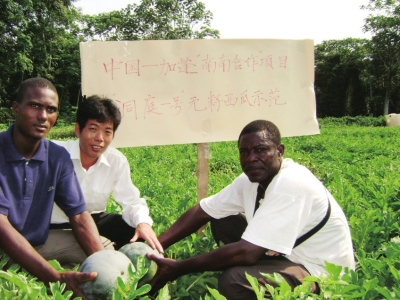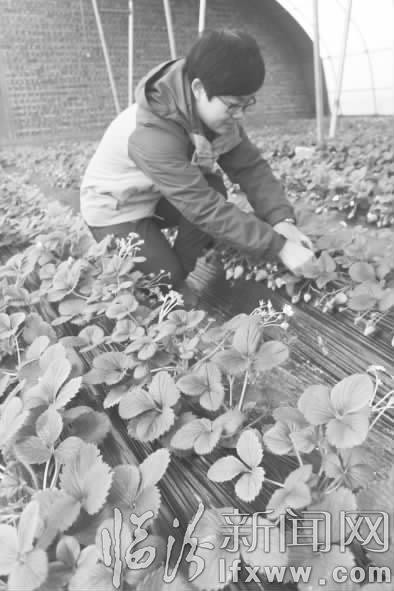Wang Anhua: sowing the seeds of agricultural technology in Africa

Wang Anhua and the growers took a group photo in the field of seedless watermelon trial.
Thousands of miles away in the land of Africa, there is such a group of popular Chinese: with a sincere heart, with advanced agricultural technology and equipment, and with a lot of energy, they do not wait to create conditions for trial and demonstration to help local farmers lead a prosperous life.
Wang Anhua, a senior agronomist from Hunan, is one of them. He has been to Africa twice to participate in the "South-South cooperation" agricultural assistance project under the framework of the Food and Agriculture Organization of the United Nations. In his words, the greatest achievement is to "sow the seeds of agricultural technology and let more African farmers see the hope of land."
From 2007 to 2009, Wang Anhua participated in the "China-Gabon South-South Cooperation" project as a vegetable expert and was assigned to the project site in the city of Rambarre, Gabon. After a lot of research, Wang Anhua found that high-quality watermelons have a broad market in Gabon, and the soil and climate of Gabon are very suitable for the production of seedless watermelons. He is determined to use seedless watermelons as a breakthrough in technical assistance.
Wang Anhua quickly compiled the project report "High-yield cultivation and Industrial Development of Seedless Watermelon in Gabon", which was highly affirmed and approved by the Gabonese Ministry of Agriculture and FAO. Just as he was confidently preparing to implement the project, technical experts from the Gabonese Ministry of Agriculture kindly warned: "in Gabon, it is very difficult to cultivate ordinary watermelons, watermelons do not grow at all, and despite high prices, farmers generally do not grow watermelons. Seedless watermelons are unheard of."
Why is the climate and soil so suitable, but can not grow high-quality large watermelons? Wang Anhua didn't believe it at first. He conducted experiments on the cultivation of seedless watermelons, and as a result, as Gabonese agricultural experts said, watermelons no longer grow when they reach fist size.
The problem has plagued this "old agricultural technology" with 25 years of experience in watermelon planting technology promotion. He reclaimed a 400-square-meter experimental field in the resident courtyard by himself. from the beginning of sowing, he kept an eye on observation, recording, and analysis for almost 24 hours, and did not miss a single detail. During the two months of the experiment, he did not give up because of mosquito bites and malaria infection twice.
Kungfu lived up to the painstaking efforts, and the crux of the problem was finally discovered-African Mediterranean flies. Mediterranean fly-eating is a unique pest in Africa. Eggs are laid into tender melons during the young fruit period of watermelons. As the young melons grow, the eggs begin to hatch into larvae, and the larvae eat the flesh desperately, and the melons stop growing. All these processes are difficult to detect from the outside.
Having identified the problem, Wang Anhua immediately took technical measures and tried to grow big and sweet seedless watermelons, thus ending the history of Gabon not producing seedless watermelons. In the past two years, Wang Anhua has trained 15 major Gabonese seedless watermelon producers and 5 technicians. The planting area of seedless watermelon has reached 20 hectares, with an average output value of about US $20,000 per hectare. Seedless watermelon has become a sweet cause for Gabonese farmers to increase their income and become rich, and it has been listed by the Gabonese government as a priority project to revitalize the agricultural economy. In Gabon, farmers affectionately call Wang Anhua "the king of seedless watermelons".
From 2012 to 2014, Wang Anhua accepted the more arduous task of "South-South cooperation between China and Liberia". Liberia is a poor country after 14 years of war, with poor economy and poor livelihood.
As leader of the expert group on agricultural assistance, Wang Anhua led a seven-member team to overcome the difficult conditions such as lack of electricity, water and disease epidemic in Bang Prefecture, Liberia, and set up a demonstration park on its own, using the demonstration park as a platform to carry out the demonstration, promotion and skills training of new technologies.
Under the conditions at that time, it was not easy to create a demonstration park. Many of the friends who came to visit Wang Anhua did not understand: "your situation is hard enough, so why ask for hardship?"
However, Wang Anhua stubbornly sent out mobilization to all experts and students. Using simple tools, they moved nearly 500 square meters of earth and rock, dug 300 meters of drainage ditches and made 30 square meters of organic compost. At that time, everyone's hands were wearing calluses and blood blisters. Soon, 8000 square meters of abandoned land covered with weeds and masonry has taken on a new look. The demonstration fields are neat and uniform and all kinds of crops are full of vitality.
The demonstration park is not only a platform for the display of new varieties and practical technologies, but also a base for professional practical training. Over the past two years, the demonstration park has held 46 practical and operational skills training for trainees and local farmers, completed experiments and demonstrations of 21 crop varieties, including grain and vegetables, and successfully implemented 11 micro-projects in six professional areas: vegetables, rice, corn, watermelons and animal husbandry, demonstrating and popularizing 15 practical agricultural technologies suitable for Liberia. Through the experiment and demonstration, the cultivation of seedless watermelon has achieved a zero breakthrough in Liberia; the popularization of rice dry cultivation and diskless seedling throwing technology has greatly improved the production efficiency of rice cultivation and fundamentally changed the rice cultivation mode in Liberia.
Advanced planting technology has also brought about improvements in the lives of local farmers. Farmers MOSES and his family of six keep nearly 2 hectares of land all the year round, but due to extensive technology, they are busy at the end of the year and can only maintain food and clothing. With the help of Wang Anhua, through training in the demonstration garden, he planted 2000 square meters of new varieties of chili peppers and seedless watermelons, which earned a net income of 3100 US dollars in just half a year, causing a great sensation in the local area. MOSES excitedly told reporters that it was the first time in his life that he had made so much money that he could not express his gratitude to Chinese experts in words.
Related
- A course of planting techniques and methods on how to grow carrots
- How to plant the latest tulips?
- Is it better to pick tea in the morning or in the afternoon? When is the best time for tea to be picked? what is the third or fifth tea?
- Launch Yuanxiao Happy combination Haocha + Tea Yuan healthy Taste
- Penghu Tourism "Fireworks 20 Parade with You"
- 2022 West Lake Happiness holds "Digital Revitalization Voucher" and draws iphone13 and laptop.
- Banqiao Fuzhou social houses are designed to change start-up combined with police elimination to create a safe and livable environment
- The convenient measure of "mechanical weeding" in Xinbei has been abused and the Agriculture Bureau has imposed heavy penalties on the illegal land consolidation.
- Changgeng University Joins Hands with Four Memory Factories to Rescue Memory Talent Shortage
- The list of Taiwan's top 100 MVP managers is listed by the Director-General of the Farmers' Association of Sanxia District.



